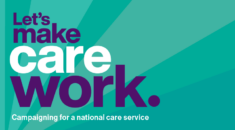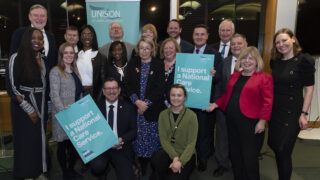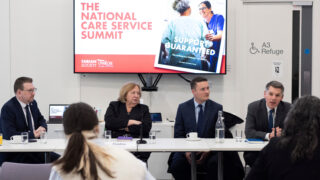More than half of care workers (52%) say their employer is still paying less than £100 a week or nothing at all if they need to shield or self-isolate, new research from UNISON published today (Monday) shows.
Five months into the pandemic, most care staff face severe financial hardship if they follow public health guidance, which harms efforts to control infection in the sector the union says.
The survey of more than 2,500 UK care workers in a range of settings including residential care and home visits highlights a failure of basic measures to reduce the rate of infection in the sector, says UNISON.
The government launched a scheme that is supposed to ensure staff are fully compensated if they need to stay off work because they tested positive, were showing symptoms or were shielding.
The £600m infection control fund was announced by the government in May. Health and social care secretary Matt Hancock said at the time that one of the purposes was to ensure care staff were “not penalised” for staying away from work.
But the survey reveals the money is not getting through, with more than two fifths (44%) saying their employer is offering just statutory sick pay (SSP) of £95.85. Around one in 12 (8%) say they and colleagues are not being paid at all if they need to stay at home.
UNISON says this increases the infection risk because many staff are forced to carry on working, otherwise they would struggle to pay bills. Employers should be compelled to make sure the money reaches staff and they are not out of pocket, the union says.
Responses to the survey, conducted over two weeks in July, show other serious failings in the system. One in nine care staff (11.5%) say they are not getting the essential personal protective equipment they need in order to do their jobs safely.
Almost half (48%) said they have never been tested for Covd-19, despite repeated government pledges about care sector staff being monitored regularly.
Less than a quarter (24%) of all the respondents had been tested more than once since the beginning of the pandemic, and half of these had been tested just twice.
UNISON assistant general secretary Christina McAnea said: “Enough is enough. Throughout the pandemic care workers have shown amazing bravery and commitment to continue looking after the vulnerable under terrible circumstances.
“But five months in, many are still getting massive reductions in pay if they follow public health guidance.
“This is deeply unfair and it’s driving the infection rate in the care sector. Lives are being put at risk.
“The government has claimed its infection control fund would stop this happening to frontline care workers.
“Now we can clearly see the money isn’t getting through. It’s another example where delivery falls far short of promises in social care.
“Ministers must make it mandatory for employers to use these funds to pay care workers fairly and properly when off they’re off sick.
“It’s deeply worrying so many care workers say they’ve still not been tested. Government and employers need to urgently sort it out so there’s no repeat of the distressing conditions in the care sector over recent months.”
Comments made by care workers who took part in the survey include:
- “I contacted the virus at my place of work and only received two weeks statutory sick pay. My family all contracted the virus from me. To not receive full pay during this very difficult time was disgraceful.”
- “I am entitled to sick pay but only got SSP. The care home I work for got huge grants to cover Covid-19 costs but the company only gave full pay to those who were off work after 13 May. That meant that when the pandemic was at its height and most people were off work, they didn’t get paid properly.”
- “I was off sick for three weeks and Covid-positive, but my manager said because I didn’t get it at work, we can’t pay you. She said I can get less than £15 a day only. I still have bills to pay, but she said no money because you didn’t get the virus here.”
Notes to editors:
– UNISON surveyed 2,576 staff working in different care settings including residential homes and domiciliary care between 3 July and 17 July.
– UNISON is the UK’s largest union, with more than 1.3 million members providing public services – in education, local government, the NHS, police service and energy. They are employed in the public, voluntary and private sectors.
Media contacts:
Anthony Barnes M: 07834 864794 E: a.barnes@unison.co.uk
Sophie Goodchild M: 07767 325595 E: s.goodchild@unison.co.uk




